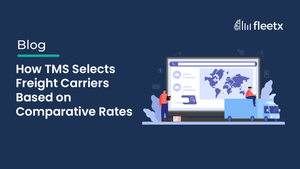
Fleet management is the central part of Supply-Chain for any modern business. It is most essential to the logistics industry where their business output is very much dependent on an efficient system of transport fleets run and managed by a skilled fleet manager. At times, the cost of supply-chain can make or break your annual business output, which is directly dependent on the efficiency at which your fleet operates.
Who are fleet managers?

Fleet Managers are responsible for the complete functioning and maintaining their fleet
A fleet manager is someone who controls all aspects of a company’s fleet. Starting from the hiring of the drivers to resource management to maintaining the efficiency of the fleet, a fleet manager’s role could be a complicated one.
To put it into perspective, when we see tens of similar trucks with the same branding lined up on a highway, transporting goods from one corner of the country to another, the entire responsibility of
- Hiring the drivers for the trucks
- Timely maintenance and fueling of the trucks
- Arrangement of Food and Lodging for the drivers
- Timely pickup and delivery of the goods
- Cost-benefit analysis of the entire trip
and every single task in between, one person is calling the shots and running the show, it's the Fleet Manager. Expand the scope of the fleet from trucks to cars, fork-lifts, specialist vehicles, vans, cargo ships and every other commercial motor vehicle-based services, you have an industry of Vehicle Tracking System
Challenges faced by a Fleet Manager

We already discussed a variety of responsibilities a fleet manager has to take care of. In the case of companies offering Fleet Services to hundreds of clients. We also know that “With great power, comes great responsibility” and “with great responsibility comes even greater sets of challenges”.
Fleet Managers deal with a complex set of challenges that are unique to their industry
The toughest challenge with traditional methods of fleet management is the taking constant updates from tens and even at times, thousands of drivers who are on route, it requires 24x7 availability on a phone which is bound to consume a lot of headspace of any fleet manager.
GPS solutions offered by various providers can help track your fleet but there is more to fleet management than knowing the coordinates of one of your trucks.
Fleet Managers have to deal with a plethora of other problems, let’s list down a few common ones that are faced across industries.
- Refuelling of all transport vehicles on the route
- Fuel Thefts from trucks during a trip
- Regular check and maintenance of all transport vehicles in your fleet
- In-order paperwork for all the drivers and vehicles
- Maintaining TAT for the client
- Breakdown or exhausted fuel tanks during a trip
- Unresponsive drivers and disputes
- Odometer tampering ‘Firki’ by drivers
- Rerouting or wrong routes that are taken by the driver
- Congestions on routes and construction work leading to unconventional routes
- Damaged goods in case of late deliveries, especially in cold storage products
- Poor handling resulting in chemical hazards in case of medical and other critical goods
- And countless other small and big issues during the trip
These problems can greatly hamper your fleet efficiency leading to poor budget margins and dissatisfied clients. In this competitive market, losing your competitive edge is equivalent to losing your client.
Role of Technology in Fleet Management

Automation and technology can help companies and fleet managers be far more efficient and competitive, resulting in improved TATs and higher profit margins. AI-driven and data-centric fleet management services & solutions are helping companies use data and tech to drastically improve their efficiency.
Location Technology made tracking at scale precise
To understand how important technology has become in fleet management one can look at the most important tool aka Real-Time location & navigation which helps fleet managers keep track of their entire fleet from a single screen. Without it, even the most efficient fleet managers would find it impossible to run operations.
Fuel Management Systems saves a fortune in fuel costs and waste
Similarly, other technological features like fuel-management systems which help track fuel requirements for every vehicle in your fleet and help cut fuel-costs are being heavily leveraged by companies to cut their operating costs and provide much competitive pricing which attracts more clients.
Scheduling and Routing systems improve time management and delivery
Human errors and negligence while route mapping is a leading cause for late dispatch and deliveries. On the other hand scheduling and routing systems which run on data and calculations leaves no room for error, thus, delivering fool-proof route maps which are updated in real-time for changes. It helps fleets avoid hundreds of unintentional u-turns and rerouting.
Fleet Maintenance Systems helps track vehicle maintenance for timely repairs increasing vehicle longevity
‘Fixing it only when its broken’ attitude towards vehicles operating in the fleet results in untimely maintenance of the vehicle. This can degrade performance over time causing more frequent breakdowns and high repair cost. The solution is timely maintenance but tracking and maintaining records of hundreds of vehicles could get very difficult for a single fleet manager to handle. Hence, more and more fleet managers are turning towards fleet maintenance systems to take care of it for them, reducing their workload and increasing vehicle’s health.
Tech vs Non-Tech Fleet Management
The competition in the logistics and fleet management industry is heating up. Customers want more efficiency at a lower cost and fleet companies are competing in a cut-throat market to gain the lion’s share of the fleet service industry. As a result, newer fleet companies are leveraging tech to cut their operating costs while increasing efficiency exponentially. This is allowing them to offer clients better services at a fraction of the cost compared to their non-tech counterparts.
What makes tech-based fleet services outperform non-tech fleet services?

As a result, traditional Fleet Services companies have seen a decline in their revenues directly reducing their profits, while the operational cost has steadily increased. It won’t be too long until technology-based companies become the dominant player in the fleet service industry and traditional companies are forced to shut shops. After all, the one who offers more while costing less will eventually survive.
The solution
A combination of technology and human resource can escalate your business to new heights

To stay in business, traditional Fleet Services companies need a mixture of technology and human trust. A strategy which combines the trust of human supervision with the reliance of technology to compete on par with the tech-based solutions out there. This is where Fleet Management Solutions shines.
Traditional fleet service companies already have a trusted Network of Clients, respected Brand Value, and Wide Presence in the market. By embracing technology in their operations they not only cut operational cost significantly but will also be helping their Fleet Managers increasing their efficiency and thus, resulting in more efficient services and scaling high revenues.
Technology-based Transport Management System & Solutions are helping traditional fleet service companies transition and embrace technology in their day-to-day operation, giving them an edge over new tech-based startups.







